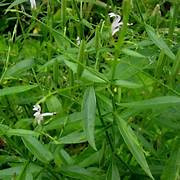Effects of Solvent Variation on The Antioxidant, Anti-Inflammatory, and Alpha-Glucosidase Inhibitory Activity of Andrographis paniculata (Burm.f.)Wall Leaves Extract http://www.doi.org/10.26538/tjnpr/v8i1.36
Main Article Content
Abstract
Andrographis paniculata (Burm.f.) Wall, Acanthaceae, is a plant that grows in the lowlands at 700 meters above sea level. This study aimed to determine the antioxidant activity, alpha-glucosidase enzyme inhibition, and anti-inflammatory activity of Andrographis paniculata (Burm.f.) Wall leaf extract using ethanol and butanol as extraction solvents. The extraction process was accomplished using the Ultrasonic Assist Extraction (UAE) method. The result showed that ethanol and butanol extract yields were 8.88% and 9.02%, respectively. The ethanol and butanol extracts exhibited potent antioxidant activity with IC50 values of (2 – 45) mg/L from the FRAP assay. The extracts also demonstrated potent anti-inflammatory activity with an IC50 range of 0.5-15 mg/L. Also, the ethanol extract showed good alpha-glucosidase inhibitory activity with IC50 = 9.49 ± 0.04 mg/L. The butanol extract showed inhibitory activity against alpha-glucosidase enzyme with an IC50 value of 29.12 ± 0.019 mg/L. The results also showed that the antioxidant, anti-inflammatory, and alpha-glucosidase inhibitory activity of the ethanol leaf extract of Andrographis paniculata (Burm.f.) Wall was slightly higher but not significantly different from butanol; as such, butanol could be used as an alternative solvent to ethanol.
Downloads
Article Details

This work is licensed under a Creative Commons Attribution-NonCommercial-NoDerivatives 4.0 International License.
References
Brunner, Suddarth, Buku Ajar Keperawatan Medikal Bedah (8th ed). Jakarta: EGC Medical Book Publishers; 2002.
Yuda IP, Aryenti, Juniarti. α-Glucosidase inhibitor activity of Toona sureni leaf extract as antihyperglycemic. Pharma Medika Health Magazine. 2018;10(2):63–70.
Andi EB, Made A, Tutuik W, Nancy DY. Antioxidant capacity and alpha-glucosidase inhibitor of Dayak onion bulb extract. J Food Sci Technol. 2013; 24(2): 161-167
Feng J, Yang XW, Wang RF. Bio-assay guided isolation and identification of α-glucosidase inhibitors from the leaves of Aquilaria sinensis. Phytochem. 2011;72: 242-247
DiNicolantanio JJ, Bhutani J, O’Keefe JH. Acarbose: safe and effective for lowering post-prandial hyperglycemia and improving cardiovascular outcomes. Open Heart. 2015;2(1):1-13
Shibano M, Kakutani K, Taniguchi M, Yasuda M, Baba K. Antioxidant constituents in the dayflower (Commelna communis L.) and their alpha-glucosidase activity. J Nat Med. 2008; 62: 349-353
Yunita E. Mechanism of action of Andrographolide from bitter as an antioxidant compound. J Herb Med. 2021; 4(1):43-56
Subramanian R. 2008. In vitro α - glucosidase and α -amylase enzyme inhibitory effects of Andrographis Paniculata extract and Andrographolide. Malaysia: Department of Pharmacology, School of Pharmacy, Universiti Sains Malaysia; 2008
Singleton VL, Orthofer R, Lamuela-Raventos RM. Analysis of total phenols and other oxidation substrates and antioxidants by means of Folin Ciocalteu reagent. Methods Enzymol. 1999; 299:152-178
Candra I, Maman S, Riri E, Imalia DP, Aulia N, Avisani D, Tiara A. Phytochemical screening, total phenolic, and potential of methanol extract Musa balbisiana Colla as antioxidant and anti-gout. Res J Pharm Technol. 2021;16(2).
Naik GH, Priyadarsini KI, Satav JG, Banavalikar MM, Sohoni DP, Biyani MK, Mohan, H. Comparative antioxidant activity of individual herbal components used in Ayurvedic medicine. Phytochem. 2003; 63 (1):97-104
Kurniasari, D, Soesilowati, R. The Influence of Urinary Incontinence on the Depression Levels of Elderly Women at the Catur Nugroho Kaliori Nursing Home, Banyumas. Saintex. 2016; 13(1)
Wahyu BL, Rini P, Gunawan WS, Wilis AS. Types of methanol and n-hexane solvents on the antioxidant activity of Gelidium sp seaweed extract from Drini Beach Gunungkidul – Yogyakarta. Trop Marine J. 2018; 21(1):9–16
Singleton VL, Rossi JA. Colorimetry of total phenolic with phosphomolybdic-phosphotungstic acid reagent. Am J Enol Vitic.1965; 16: 147
Nely F. Antioxidant activity of market spices and factory spice powders using the polyphenol method and AOM (Active Oxygen Method) test [thesis]. Bogor: Bogor Agricultural Institute; 2007
Ndhlala AR, Moyo M, Staden JV. Natural antioxidants: fascinating or mythical biomolecules ? Molecules. 2010; 15: 6905-6930.
Prastiwi R, Elya B, Hanafi M, Desmiaty Y, Sauriasari R. The antioxidant activity of Sterculia stipulata Korth woods and leaves by FRAP Method. Pharmacog J. 2020; 12 (2): 236-239
Xican L, Xiaoting W, Ling H. Correlation between Antioxidant Activities and Phenolic Contents of Radix Angelicae Sinensis (Danggui). Molecules. 2009; 14(12): 5349-5361
Rumayati, Nora I, Lia D. The antioxidant activity, total phenols, and toxicity of Lacum (Cayratia trifolia (L) Domin) leaf and stem extracts. JKK. 2014; 3(3): 30-35
Farida Y, Rahmat D, Amanda AW. Anti-inflammation activity test of nanoparticles ethanol extract of Temulawak rhizome (Curcuma xanthorrhiza Roxb.) with protein denaturation inhibition method. J Pharm. 2018; 2: 225-230
Beg S, Swain S, Hasan H, Barkat MA, Hussain MS. Systematic review of herbals as potential anti-inflammatory agents: Recent advances, current clinical status, and future perspectives. Pharmacogn Rev. 2011;5:120–137.
Lucas L, Russell A, Keast R. Molecular mechanisms of inflammation. Anti-inflammatory benefits of virgin olive oil and the phenolic compound oleocanthal. Curr Pharm Des. 2011;17:754–768.
Ari Y, Nita S. Inhibitory activity of the alpha-glucosidase enzyme from bangle (Zingiber cassumunar Roxb.) rhizome extract in vitro. Media Pharmaceutica Indonesiana. 2018;2(1)
Lee SY, Abas F, Khatib A, Ismail IS, Shaari K, Zawawi N. Metabolite profiling of Neptunia oleracea and correlation with antioxidant and α-glucosidase inhibitory activities using 1H NMR-based metabolomics. Phytochem Lett. 2016; 16:23–33.
Nakhaee A, Sanjari M. Evaluation of effect of acarbose consumption on weight losing in nondiabetic overweight or obese patients in Kerman. J Res Med Sci. 2013;18(5):391-4.


